Does Linux market share matter? What matters?
by Muungwana
Each year is declared the "year of Linux" or "the year of the penguin," and every year ends with a disappointment because Linux market share fails to increase significantly in that year. As a matter of fact, Linux market share has been hovering around 1% for a really long time, with no sign of a major breakthrough anytime soon. Is Linux a player in the desktop space with the market share it has? How much market share should Linux have to begin to matter?
Linux doesn't need to have a large market share in order to matter. Large market share will actually do Linux more harm than good, since it will have to compromise on ideas and principles that carried it this far, in order to accommodate new users who have no idea or interest in knowing these ideas. OS X has had the same small market share for the same reasons. Apple chose to stick to its guns, taking a hit on market share, because it wants its users to know what Apple stands for, and only accommodate those who agree with their ideas of how a desktop computer is to be presented and used.
Mac OS X has around 4% world wide, and around 7% in the US in desktop operating systems market share. However, OS X plays a critical part in shaping the present and future of desktop computing. Market share is important, but not that important. What is important is mind share. OS X has a mind share much much larger than the market share, and that is what makes the industry pay attention to what it is doing.

Linux, as an operating system, will not benefit that much from increased market share. It will, however, benefit much more from an increase in mind share of ideas that brought it up and propels it forward, and these ideas are working. The industry is starting to pay attention, and use them as it runs around trying to maximize its shareholder's pockets. Most web browsers today are built around these ideas, and web technologies are moving towards these ideas. Android and WebOS, two of the hottest operating systems powering smart phones today, stand on the shoulders of these ideas. The next generation office file formats are structured around these ideas. The net neutrality debate has some elements of the same ideas. .Net makes up a core of current and future versions of Windows, and core parts of its specifications are released to the masses to "appease" advocates of these ideas. Microsoft, a heavyweight in the computing world, is starting to cave in to the ideas.
There most likely will never be a 30-second Linux commercial during the Super Bowl, but these ideas are taking hold and gaining strength, sneaking in from the bottom of the corporate world, and going upwards. These ideas are what will shape the future of computing for decades to come, and Linux market share will increase as a side effect of these ideas taking hold. Most likely, Linux will never reach a currently unknown market share upper limit, if it is to stay true to itself, as it should. It will do more harm than good if Linux compromises on these ideas for a few points in market share.
What will be the optimal market share desktop Linux should aim for to keep those who care about it happy? Should it matter?
